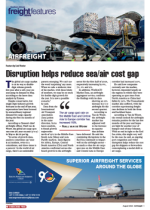Digitalisation in the airspace arena remains sluggish, with many industry players hesitant to embrace available technologies. “As an industry, we need to lean into digitalisation and not run from it,” said Anna Balan, head of CargoBooking.Balan emphasised the need for trust in these tools, asserting that once the benefits were evident, adoption would be inevitable – but until the technology is given the chance to transform operations, the sector will continue to lag.In the African space, she highlighted CargoBooking's success. The company launched an open-access version of its platform in South Africa last year and saw a rapid uptake. “Over 20% of South Africa’s air cargo capacity is now supported on CargoBooking, showing the African airfreight market’s openness to change and eagerness to embrace new technology,” she told Freight News. “It’s a promising example of how adapting to new technical developments can lead to tangible success for your business.”According to Balan, innovative digital solutions are helping the air cargo business to streamline their processes. “By automating repetitive tasks such as data entry, technology is enabling ef f icienc y, reducing the risk of human error, and allowing for a renewed focus on customer service by relieving workers from work that can be automated,” she said. “This efficiency means that those adopting newer digital tools have the competitive edge. Being able to provide a quote, send an invoice, or just respond faster, will ultimately result in more business. With the time-consuming processes taken care of, and to a higher degree of accuracy, workers can excel in the areas where technology isn’t able to, such as interacting with clients.”She said digital tools were also providing important data points that could be used when analysing performance or informing strategy and progress.Balan noted that the benefits of AI and automation were already evident, with companies slow to implement these technologies falling behind.“A fear of adopting new technology to protect reliability is short-sighted, but the refusal to adapt with changing technologies is only more so,” she said, urging local airfreight operators to embrace digitalisation. “A more open and free industry approach to sharing information and data across the whole supply chain is, however, necessary to accelerate the change towards digital adoption.”Asked about next-gen tech, Balan said AI was undoubtedly the technology that would have the greatest impact on air cargo in the near future. “Its effect is already immense.“CargoBooking is already deploying AI through our tool, eMagic. It uses AI to process the content of incoming emails and texts, converting inquiries into readable formats and quotes and removing the need for expensive, time-consuming manual processing. The data transfer accuracy is 99%, minimising any risk caused by human error.”

